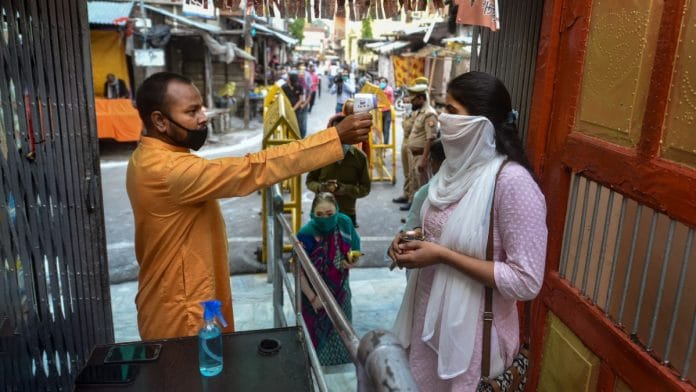New Delhi: It is now fairly well-established that the novel coronavirus affects multiple organs in the body.
A study, involving 153 patients treated in UK hospitals, published in The Lancet Psychiatry journal Thursday, has now found a range of neurological and psychiatric complications that may be linked to the disease.
“To our knowledge, this is the first nationwide, cross-specialty surveillance study of acute neurological and psychiatric complications of Covid-19,” wrote the researchers from the University of Liverpool and University of Newcastle, among others, in the journal.
“Altered mental status was the second-most common presentation, comprising encephalopathy or encephalitis and primary psychiatric diagnoses, often occurring in younger patients. This study provides valuable and timely data that are urgently needed by clinicians, researchers, and funders to inform immediate steps in Covid-19 neuroscience research and health policy,” according to the researchers.
All the patients included in the study were severely affected by the disease, so the researchers said it is not possible to draw conclusions from this study about the total proportion of Covid-19 patients likely to be affected.
They called for more studies to understand the psychiatric and neurological effects of the SARS-CoV-2 virus.
Dr Benedict Michael, lead author of the study, from the University of Liverpool, said: “There have been growing reports of an association between Covid-19 infection and possible neurological or psychiatric complications, but until now these have typically been limited to studies of ten patients or fewer. Ours is the first nation-wide study of neurological complications associated with Covid-19, but it is important to note that it is focused on cases that are severe enough to require hospitalisation.”
Also read: South Asians are at higher risk of dying due to Covid in UK hospitals, study finds
The findings
The most common brain complication observed was stroke, reported in 77 of 125 patients (the study has data available for only 125 patients). A stroke is when blood supply to any part of the brain is cut off and if not treated over a long period, cells in those parts of the brain could die.
Of these 77 patients, 57 had an ischaemic stroke caused by a blood clot in the brain, nine patients had a stroke caused by bleeding in the brain, and one patient had a stroke caused by inflammation in the blood vessels of the brain.
The researchers reported that 39 patients showed signs of confusion or changes in behaviour reflecting an altered mental state.
Of these, nine patients had unspecified brain dysfunction, known as encephalopathy (broadly refers to damage to any part of the brain), and seven patients had inflammation of the brain, medically termed encephalitis.
The remaining 23 patients with an altered mental state were diagnosed with psychiatric conditions that the patient did not have a history of before contracting Covid.
These 23 patients with psychiatric diagnoses, included ten patients with a new onset psychosis and six patients with a dementia-like syndrome. Seven of these patients had signs of a mood disorder, including depression and anxiety.
Information about age was available only for 37 of the 39 patients with an altered mental state, and of those, 18 were aged below 60 years.
Professor Sarah Pett, co-author of the study, from the University College London, said: “This data represents an important snapshot of the brain-related complications of Covid-19 in hospitalised patients. It is critically important that we continue to collect this information to really understand this virus fully.”
“We also need to understand brain complications in people in the community, who have Covid-19, but were not sick enough to be hospitalised. Our study provides the foundations for larger, hospital and community-based studies. These studies will help inform on the frequency of these brain complications, who’s most at risk of getting them, and ultimately how best to treat,” he added.
Also read: First official figures on Covid among healthcare workers in India — 1,073 cases until 23 May
Younger patients showed psychiatric symptoms
The study reported a high percentage of younger patients with psychiatric symptoms and said this would need further investigations, said the researchers.
“Confirmation of the link between Covid-19 and new acute psychiatric or neuropsychiatric complications in younger patients will require detailed prospective longitudinal studies. Understanding this association will require systematic participant evaluation, characterisation of immune host responses, exploration of genetic associations, and comparison with appropriate controls (including patients hospitalised with Covid-19 who do not have acute neuropsychiatric features),” they wrote.
The study pointed out that while altered mental status is common in patients admitted to hospital with severe infection, especially in those requiring intensive care management, it is typically associated with the older age groups and may actually be symptoms of an existing undiagnosed neurodegenerative disease or be linked to comorbidities.
Some of it is also linked to the use of sedatives in older patients.
“In this study, we observed a disproportionate number of neuropsychiatric presentations in younger patients and a predominance of cerebrovascular complications in older patients, which might reflect the state of health of the cerebral vasculature and associated risk factors, exacerbated by critical illness in older patients,” the researchers wrote.
Also read: Flushing toilets can create virus ‘cloud’, says study, raises concern on Covid-19 spread






